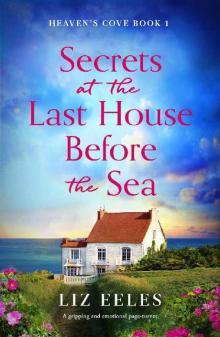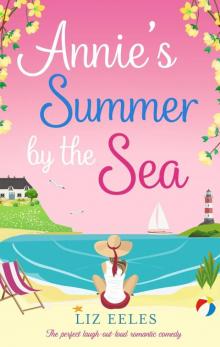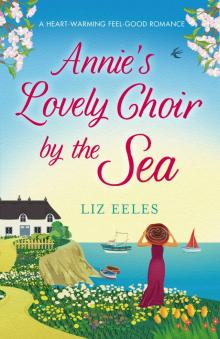Annie’s Summer by the Sea: The perfect laugh-out-loud romantic comedy Read online
Annie’s Summer by the Sea
The perfect laugh-out-loud romantic comedy
Liz Eeles
Contents
Chapter 1
Chapter 2
Chapter 3
Chapter 4
Chapter 5
Chapter 6
Chapter 7
Chapter 8
Chapter 9
Chapter 10
Chapter 11
Chapter 12
Chapter 13
Chapter 14
Chapter 15
Chapter 16
Chapter 17
Chapter 18
Chapter 19
Chapter 20
Chapter 21
Chapter 22
Chapter 23
Chapter 24
Chapter 25
Chapter 26
Chapter 27
Chapter 28
Chapter 29
Chapter 30
Chapter 31
Chapter 32
Chapter 33
Chapter 34
Epilogue
Annie’s Holiday by the Sea
Hear more from Liz
Also by Liz Eeles
A Letter from Liz
Annie's Christmas by the Sea
Acknowledgements
For my wonderful mum and dad, Margaret and Ivor
One
I’m seriously starting to think there’s a poltergeist at Tregavara House. Not some random woo-woo spirit of the undead who likes chucking stuff about. But a seriously narked ancestor of mine who gets his rocks off trying to brain me with masonry.
‘Crikey, Annie. That could have been nasty.’ Josh kicks at the shattered tile that missed my head by centimetres and glances up at the storm-battered roof. It’s the second tile that’s fallen off this week. ‘Maybe I should get the ladder out and have a go at fixing it.’
As he pulls me close for a huge thank-God-you’re-not-hurt hug, I wonder how best to broach that this is very possibly the worst idea in the world.
Josh, my gorgeous Cornish boyfriend who gives Poldark a run for his money, is a New Man in many ways. He helps me look after my great-aunt Alice. He does the washing up without being asked. He even cleans the bathroom without bragging on Facebook as though it’s heroic.
But in a strange throwback to pre-feminist times, Josh still believes he has an innate ability to ‘fix’ things on account of his manly genes. As though DIY skills are passed from father to son at conception or transmitted by osmosis from one male to another. And he gets dead shirty if I imply otherwise. It’s weird. My father, Barry, rarely seen without a hammer in his hand, is exactly the same. It must be a Man Thing.
Before I can inform Josh gently that his DIY skills are diabolical, my half-sister Storm bowls out of the front door and stops dead in front of the tile fragments scattered across the garden path.
‘What the actual hell is going on? This place is falling down and you need to do something about it ’cos, if a bit of house lands on me, I’ll have to sue. It won’t be personal,’ she assures me, brushing back a strand of purple hair that’s caught in the sea breeze. ‘But it would be daft not to. Kayla’s cousin in Adelaide got ten grand for saying a scaffolding pole fell on her head. She was lying but Kayla reckons insurance companies are fair game.’
Not for the first time, I wonder whether my friend Kayla is a good influence on my sister. A while back, they hated one another and were having scowl-offs across the bar of my local, the Whistling Wave. But now they huddle together in corners and giggle about my crush on Paul Hollywood. It’s very disconcerting.
Storm saunters on along the path, wincing at the squeals of two children rushing headlong towards the harbour with their mum trudging behind. I don’t recognise them but Salt Bay is always full of tourists on a beautiful May day.
‘Don’t worry, Storm,’ Josh calls after her, resting his chin on the top of my head. ‘I’ll get up onto the roof later and sort it out.’
Storm hesitates with her hand on the gate and snorts. ‘Yeah, you do that, Josh, ’cos then everything will be just fine.’
She treats me to one of her teenage eye-rolls before heading for the village newsagent’s where she works on Saturdays. Her arms are bare and, though we’ve only had a few days of unbroken sunshine, her skin already has a golden glow. She looks far healthier than when she first arrived at Tregavara House from London – and purple hair suits her. Dyed hair is frowned upon at her school but, now the summer term is in full swing, she’s banking on the teachers being too knackered to care.
‘We’d better get a proper roofer in. I don’t want you falling off a ladder and breaking something, and I think it’s gone beyond DIY.’ I snuggle against Josh’s soft T-shirt and breathe in his musky smell. ‘How much do you think it’ll cost?’
‘To fix the roof?’ His deep voice vibrates through me with its soft Cornish burr. ‘Lots, I expect, so you’d better talk to Alice before you get someone in to look at it.’
He’s only being sensible getting my great-aunt involved. The house belongs to her, after all. But my mood dips as I gaze across the china-blue sea that’s lapping gently against the harbour wall.
Everything is wonderful right now. In front of me, seagulls are skimming sun-kissed waves and soaring high over granite cliffs that drop into the ocean. Tregavara House, built where the land meets the sea, is my new home and, best of all, Josh has moved in with me and my ‘family’ – a ragbag of bona fide relatives and Emily, Alice’s live-in carer.
And he really is gorgeous. Josh and I have been going out for thirteen months now, not counting a slight blip late last year and, having kissed my fair share of frogs, I’m sure he’s the man of my dreams. He’s tall and dark and kind and funny – and only a tiny bit grumpy. Much less grumpy than he used to be, now he’s happily settled with me.
Which means that my life is fabulous, or would be if Alice wasn’t fading in front of my eyes. My great-aunt, a fiercely proud and independent woman, frightened the life out of me when we met for the first time sixteen months ago. But, these days, the scariest thing about Alice is her deteriorating health – and the last thing she needs are money worries.
So far, she’s been pretty chilled about the fact that our ancestral home is in desperate need of repair. But it can’t be ignored for much longer. Centuries of fierce storms are starting to take their toll and, to be fair, if I’d been standing in a Cornish wind for two hundred years, I’d be crumbling too.
‘Talk to her,’ urges Josh, dipping his head to plant a warm kiss on my lips. ‘You can’t shield her from everything, even though I know you want to. But she can take it.’
While Josh goes in search of a dustpan to brush up the shattered tile, I step outside the front garden to pick up an ice-cream wrapper that’s dancing in the breeze. Flaming tourists! Why can’t they take their rubbish home after their day trips instead of spoiling the village with litter?
I crumple the slimy Magnum wrapper and shove it into my pocket. Like a woman on a mission, I’ve become evangelical about protecting the village that I once hated. Every dropped crisp packet or cigarette butt strikes fury into my heart. Basically, I’ve become Mrs Angry of Salt Bay who runs after tourists and thrusts litter back into their hands. Josh often pretends he doesn’t know me.
‘What’s going on out here? I heard a bit of a commotion.’
Alice steps into the garden as I’m walking back up the path. She carefully negotiates the lip of the front door and hangs onto the safety rail we’ve had installed just outside. It’s only been there for a couple
of weeks but it’s already encrusted with salt from a fierce storm that blew up last week.
‘Nothing to worry about,’ I say, casually kicking bits of tile off the path and onto the garden.
‘Hhmm. I’m not senile, Annabella, and there’s nothing wrong with my eyes. I can see exactly what you’re doing. Another tile, was it?’
‘Afraid so.’
‘Can Josh fix it?’
I wrinkle my nose, aggrieved that Alice automatically assumes Josh is more practical than me. ‘I don’t think so. It’s probably time to get someone in to have a proper look at the roof. This house is getting really old and weathered, Alice. It could do with some TLC.’
Alice places her blue-veined hand on the thick stone wall of Tregavara House and spreads her fingers wide. She closes her eyes and tilts her head to one side, as though she’s communicating telepathically with the building. Which is bonkers and I mentally kick myself for being far too imaginative. Though I love every inch of this house, it’s only stone and mortar – even though the wind whistling through tiny cracks in the walls sometimes sounds like breathing.
Suddenly, Alice opens her brown eyes wide and gives a tight nod. ‘You’re right. And if the roof needs work, I know just the man. Follow me!’
Uh-oh. Alice is heading for her Bodgers Bible – the dog-eared notebook in her handbag containing contact details of people who’ve worked on the house during the last ten years. The trouble is Alice tends to get her mates in when something needs fixing and, though they’re lovely, salt of the earth Cornish folk, many of them are clueless when it comes to power tools.
I follow Alice as she shuffles through the narrow hallway and into the sitting room where her navy blue handbag is sitting on the sofa. She pulls out her notebook and starts leafing through it.
‘There you go.’ I’m not sure if Alice is waving the book at me in triumph or if her hands are shaking again. ‘Paul Trefarron from Perrigan Bay is good with a roof.’
‘Would that be the same Paul Trefarron who celebrated his eightieth birthday in the Whistling Wave last week?’
‘Hhmm. I suppose he is getting on a bit now,’ admits Alice who, almost four years older than Paul Trefarron, is no spring chicken herself. ‘But he’s still very sprightly with his new hip and knee. I’m sure he could still nip up a ladder and patch the roof together.’
‘It might need more than patching, Alice. We don’t want the rain coming in.’
Alice sinks with a loud oof onto the sofa and adjusts the skirt of her spotted brown dress. ‘We certainly don’t. Damp is very bad for old houses – and old paintings. Toby will have my guts for garters if The Lady is damaged.’
She waves her arm at the gilt-framed oil painting that dominates the sitting room wall, opposite the stone fireplace. A pretty woman looks out from the canvas, her back to the sea and sunlight glinting on her dark hair. She’s wearing a long dark skirt and white high-necked blouse with a cameo at her throat, and she’s just about to laugh. The artist has perfectly captured a moment in time, an emotion, and the woman – an ancestor of mine – seems alive. As though she might step out of the canvas and share the joke.
To be honest, the painting gave me the total creeps at first. Eyes following you round the room and all that. It made the back of my neck prickle. But I gradually fell in love with the picture’s rich colours and enigmatic subject – even before we discovered that it was painted by artist Ludo Van Teel in the mid-1800s and was worth a fortune. Though, I must admit, that made me love it just a teensy bit more.
Taking the notebook from Alice, I pop it back into the top of her open handbag. ‘Why don’t I find someone to mend the roof? So you don’t have to worry about it.’
Alice gives me a sharp look before smoothing down her thick white hair. ‘I’m perfectly capable of sorting out repairs and I’m not some old dear who needs to be mollycoddled, Annabella. I’m just a little tired at the moment.’ She rests her head on the back of the gold velour sofa and closes her eyes.
‘Which is why it makes sense for me to sort out a quote for the work and then I’ll discuss it with you before anything’s decided. Is that OK?’
Alice sighs with her eyes still closed and says quietly: ‘I suppose that would be acceptable.’ Her words seem to slur into one another and within a few moments she’s asleep, although she only got up an hour or so ago.
Gently lowering myself down beside her, I study the wrinkled skin on her face. She looks pale in the light streaming through the stone-framed window. Alice was a force of nature when we first met. A woman who’d survived the loss of husband, child and brother with grit, determination and a sharp tongue. One of those people whose life force vibrates like an aura and seems inextinguishable.
But recently she just seems like a very tired old lady. And tired old ladies aren’t immortal, are they.
Alice’s mouth falls open as I softly place my hand on hers, swallowing hard to clear the lump in my throat. My beloved great-aunt’s papery skin is cool but warms under my touch as I sit for ages, watching her chest gently rise and fall.
Two
The phone call I’ve been dreading arrives a week later – on an ordinary Friday afternoon while tourists in shorts are eating butter-yellow ice cream outside the office window. It seems everyone is gagging to get their legs out as the temperature rises, and there’s no end to the heatwave in sight.
The weather, for want of a more meteorological term, has been freaking fabulous for days. And Cornwall is roasting in golden sunshine that makes the sea sparkle like it’s sprinkled with glitter.
I love scorching hot weather – the iron smell of baked earth, sun reflecting on glass, not having to wear a coat. But it’s sparked a massive moan-fest from work colleagues Gayle and Lesley, who reckon their bodies aren’t sufficiently beach-ready to be bared. They both look fine to me, and does it really matter if there are a few wobbly bits? Just shove yourself into an M&S swimsuit and give a mental V-sign to anyone who gives a damn. But they’ve been scoffing chocolate eclairs to cheer themselves up so there’s no end to the moaning in sight.
When they launch into yet another calorie-fuelled self-hate sesh, I resist the urge to yell ‘Step away from the cakes’ and retreat to the loo for a few minutes of peace. And that’s where I am when the call comes in.
‘Annie,’ yells Lesley, rushing into the ladies’ as I’m turning on the tap. ‘You’ve got to come now. Emily’s on the phone sounding upset and she says it’s about Alice.’
So this it, then. Out of habit, I swoosh my hands under the water, barely registering that it’s far too hot, and rush back to my desk without pausing to dry them.
The office phone is next to my keyboard but I hesitate before picking up the handset. Why can’t things stay the same? I’m happy with my life here in Cornwall, happier than I’ve ever been and, if I don’t pick up the phone, I can pretend nothing has changed.
But real life doesn’t work that way. Lesley grabs the phone and passes it to me with a sympathetic smile before going back to her desk. She and Gayle start tapping at their keyboards to show they’re not really listening in, but the air is thick with tension.
When I press the handset to my ear, water droplets fall from my hands and start dripping down my neck.
‘Emily, is everything all right?’
‘Annie, there you are. I tried your mobile but it went to voicemail and I don’t like ringing you on your work phone but I needed to get hold of you and I didn’t think you’d mind this once if—’
‘Just tell me what’s happened.’
Emily takes a deep breath. ‘It’s Alice. She’s got a fever and seems confused and keeps talking about someone called Freddie and she looks ill. Really proper ill. And I’m not sure what to do so I—’
‘Have you called the doctor?’ Emily’s been Alice’s carer for a year now and isn’t usually a panicker but she’s gabbling.
‘No, I spotted Roger walking past and he’s gone to get his car so we can take Alice to A&E at Seawinds.
I don’t know if she needs to go but he says it’s better to be safe than sorry.’
Emily begins to sob as I balance the receiver between my chin and shoulder, already pushing my arms into the sleeves of my cotton cardigan.
‘Listen to me, Emily. Go with Roger, get Alice to A&E and I’ll meet you there.’
‘OK. But get there as quickly as you can.’ Emily’s breath is still coming in fast gulps but she sounds calmer. ‘Thanks, Annie. I’ll see you soon – and don’t worry.’
Don’t worry? Emily bangs down the phone while I start scrolling through the contacts list on my mobile for a taxi company. I’ll get to the hospital a.s.a.p. and text Josh from the cab on the way there. He was going to visit his mum straight after teaching and might be at her house already.
Summer traffic has clogged Cornwall’s roads and the taxi driver takes backstreets to avoid the snarl-ups. But it still seems an age until he pulls up outside the main entrance to Seawinds Hospital. The Victorian building has been added to over the years, with an ugly 1970s concrete extension and a more modern wing that’s mainly glass and huge yellow panels that glow like giant bananas in the sunshine. But the A&E department is located in the old part of the building that has high ceilings and tall, thin windows looking out onto a blue sky.
The windows, I realise, rushing along endless corridors, remind me of the six months I spent in my teens at a Victorian school in Islington. Before Mum insisted that we move again. We were always on the move from Mum’s demons, as though she could pack up and leave her mental health problems behind. If only it had been that easy.

 Secrets at the Last House Before the Sea
Secrets at the Last House Before the Sea A Christmas Wish and a Cranberry Kiss at the Cosy Kettle: A heartwarming, feel good romance
A Christmas Wish and a Cranberry Kiss at the Cosy Kettle: A heartwarming, feel good romance A Summer Escape and Strawberry Cake at the Cosy Kettle: A feel good, laugh out loud romantic comedy
A Summer Escape and Strawberry Cake at the Cosy Kettle: A feel good, laugh out loud romantic comedy Annie’s Summer by the Sea: The perfect laugh-out-loud romantic comedy
Annie’s Summer by the Sea: The perfect laugh-out-loud romantic comedy Annie's Lovely Choir By The Sea
Annie's Lovely Choir By The Sea